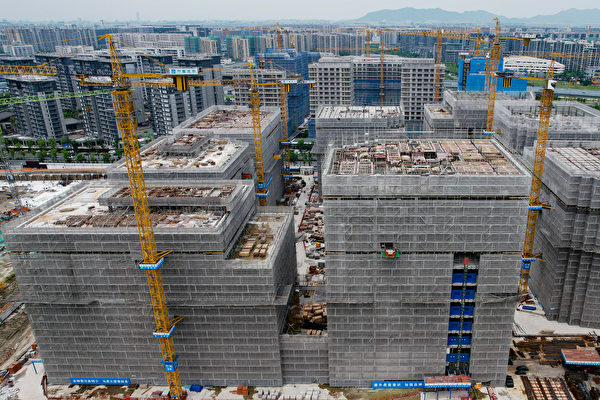The Chinese Communist authorities’ introduction of three housing systems – housing inspection, housing pension, and housing insurance – has sparked controversy. Several experts have analyzed that the Communist Party’s promotion of these three housing systems serves four main purposes, resembling a version 2.0 of land reform that aims to siphon money while potentially worsening the housing market.
On August 23rd, the Chinese Communist Ministry of Housing and Urban-Rural Development announced the trial implementation of housing inspection, housing pension, and housing insurance systems in 22 cities including Shanghai. One key aspect is the establishment of individual accounts for housing pension, funded through the payment of residential special maintenance funds, with the government focusing on creating public accounts.
This announcement caused widespread concern, as netizens questioned the source of funding and whether the authorities have ulterior motives. Despite official attempts to address concerns, the core issue remains unresolved, as the sources of funds – including land transfer fees and local finances – are already severely insufficient.
The implications and motives behind the Communist Party’s promotion of these three new housing systems continue to draw attention. American economist David Huang pointed out that the Communist Party’s introduction of these systems serves four key objectives.
Firstly, the Communist Party’s standards and requirements for urban and housing construction lag behind, leading to potential quality issues with existing housing stock. There is a pressing need for governance mechanisms to address construction and design approval, hence one of the goals of these new systems.
Secondly, by shifting responsibilities in construction design and approval from the government to considerations such as insurance coverage and pension funds, the system aims to address existing conflicts and focus on creating effective mechanisms to ensure long-term housing safety and sustainability.
Thirdly, the authorities aim to increase local government economic benefits through these new housing systems, essentially opening up avenues for new infrastructure projects that generate additional revenue streams, offering opportunities for rent-seeking practices.
Finally, while seeking profits, the government aims to evade responsibility gradually, a trend observed in other welfare systems like pension and healthcare insurance in China. These transitions highlight a progressive shift of responsibility from the government to private entities and individuals over time.
Renowned expert David Huang emphasized that the housing pension system in China is unique, with local governments having profited significantly from real estate finances in the past. However, as the real estate financial sector faces challenges, meaningful fiscal reforms are necessary. Huang suggested that instead of introducing new systems like housing pensions, the government should focus on essential reforms including land finance and reduced expenditure.
Shanghai’s real estate research institute reported a surplus of over 1 trillion yuan in residential special maintenance funds nationwide over the past 20 years, with cities like Shanghai, Beijing, and Hangzhou leading with billions in surplus.
Despite the existing funds, accessibility to the special maintenance funds for citizens remains a challenge, causing skepticism over the effective utilization of these resources. The introduction of new systems like housing pension and inspection raises questions about the underlying motives of the Communist Party.
Critics argue that the proposed housing systems may lead to increased personal financial burdens as the public accounts eventually deplete, similar to the trajectory of China’s healthcare system where private contributions are increasingly demanded when public funds fall short.
President of a US real estate investment company, Jiang Pinchao, highlighted that the Chinese government’s introduction of these new systems aims at extracting funds from citizens to bolster its own financial reserves.
For instance, under the proposed housing inspection system, landlords would initially bear the costs, potentially passing on the expenses to tenants if any issues arise. Pinchao suggested that the uncertain property rights system in China complicates the responsibility allocation in housing inspections and maintenance.
Moreover, concerns were raised that these new systems will add to the instability of the housing market, dissuading potential buyers and prompting existing homeowners to consider divesting their properties. This could further exacerbate the challenges faced by the Chinese real estate market, pushing it towards a more precarious state.
In conclusion, the Chinese Communist Party’s implementation of these housing systems raises significant economic and social concerns, highlighting the need for comprehensive reforms that prioritize the interests of citizens and the stability of the housing market.

